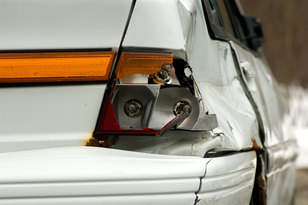Property Damage (Car Accidents) - Essential Information
If your vehicle was damaged in a car accident, here are the basic things you need to know about repairing your vehicle and/or getting compensated for the property damage, if you vehicle has been declared a total loss:
1. If you were not at fault in the accident and the driver at fault was properly insured and shared his insurance information with you, you should make a property damage claim against his insurance policy. A property damage claim is separate from any other injury claim. If the driver at fault doesn't have (sufficient) insurance coverage or it's a hit and run, then you can make the same claim against your own insurance policy. Again, this claim is separate and apart from any injury claims you. It is handled by a separate department.
If you were at fault in the accident, then the only way to get compensated for the damage to your car is if you have special coverage on your auto policy or some kind of umbrella insurance policy that covers losses in this specific type of situation.
2. If your vehicle is subject to repair, you have the right to have it repaired in any body shop of your choice. The insurance company that handles the loss will send their agent to inspect the vehicle and evaluate the cost of repairs before proceeding with work.
3. Usually, attorneys do not get involved in property damage claims because they are pretty straightforward. If there is coverage for the damage to your vehicle, either your vehicle is repaired or, if it's a total loss, you receive a fair market value (FMV) for the vehicle to be totaled. The FMV is negotiable to some extent, and after the insurance company presents you with quotes for comparable vehicles on the market, you can make arguments and data as to why you should receive more for your vehicle than they offer. This doesn't always lead to better compensation, but it can't hurt to try to negotiate.
4. A limited car rental coverage might be available on your policy or the other driver's policy. You should verify that the coverage applies and how many days of renting a car the policy covers before you rent a car to make sure you avoid any significant out of pocket expenses for car rental. If your care is being kept in a body shop awaiting repair, you should also clear with that body shop how long they can keep your car / store it before repairs and after the repairs are done so you don't incur significant parking and storage charges.
1. If you were not at fault in the accident and the driver at fault was properly insured and shared his insurance information with you, you should make a property damage claim against his insurance policy. A property damage claim is separate from any other injury claim. If the driver at fault doesn't have (sufficient) insurance coverage or it's a hit and run, then you can make the same claim against your own insurance policy. Again, this claim is separate and apart from any injury claims you. It is handled by a separate department.
If you were at fault in the accident, then the only way to get compensated for the damage to your car is if you have special coverage on your auto policy or some kind of umbrella insurance policy that covers losses in this specific type of situation.
2. If your vehicle is subject to repair, you have the right to have it repaired in any body shop of your choice. The insurance company that handles the loss will send their agent to inspect the vehicle and evaluate the cost of repairs before proceeding with work.
3. Usually, attorneys do not get involved in property damage claims because they are pretty straightforward. If there is coverage for the damage to your vehicle, either your vehicle is repaired or, if it's a total loss, you receive a fair market value (FMV) for the vehicle to be totaled. The FMV is negotiable to some extent, and after the insurance company presents you with quotes for comparable vehicles on the market, you can make arguments and data as to why you should receive more for your vehicle than they offer. This doesn't always lead to better compensation, but it can't hurt to try to negotiate.
4. A limited car rental coverage might be available on your policy or the other driver's policy. You should verify that the coverage applies and how many days of renting a car the policy covers before you rent a car to make sure you avoid any significant out of pocket expenses for car rental. If your care is being kept in a body shop awaiting repair, you should also clear with that body shop how long they can keep your car / store it before repairs and after the repairs are done so you don't incur significant parking and storage charges.
